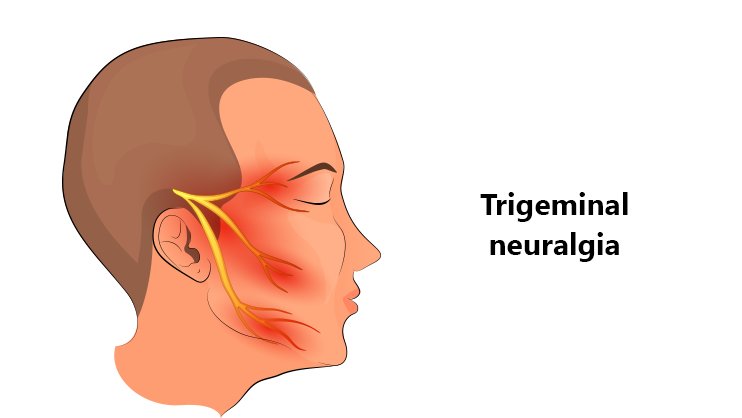Living with Trigeminal Neuralgia was a very new experience for Keke. It would have been too tough to bear but she got some help, read Keke’s story.
Life with trigeminal neuralgia
Keke’s story…
Keke Donalds had just come from an evening walk around the residential estate and stood at the porch wiping her face. She waited for her husband to bring her a glass of water while she untied her walking shoes and wiped off sweat. As she wiped the sweat, her hand brushed against her left cheek and she froze. At that moment, Mr Donalds came through the front door holding a glass and a bottle of water. One look at her and he could guess the problem.

THE BEGINNING OF HER EXPERIENCE WITH TRIGEMINAL NEURALGIA…
Mr. Donalds– “Keke, are you okay?”
Keke– “I brushed that spot” She said as tears filled her eyes
Mr. Donalds– “Dear God” He sighed and dropped the glass on the little outdoor stool.
Keke– “I just don’t get it” She said and gripped the railings.
Mr. Donalds– “Yeah, this is strange”
Keke– “Two days ago, it was while brushing that side of my teeth, the pain is unbelievable”
Mr. Donalds– “Keke, I think we need to see a dentist” He asked as he reached out to hold her shoulders
Keke– “Yeah?” She replied
Mr. Donalds– “I have an appointment with the dentist tomorrow, remember? I need to revisit that implant and get some fillings done”
Keke– “Yeah, true. So you would want me to go with you?”
Mr. Donalds– “Yeah, why not? Sure, the dentists at Schubbs would have something to say about it. Plus you’re due for a dental check-up” He said
Keke– “Schubbs Dental Clinics is a really nice place, they treat you so good. I will go with you”
Mr. Donalds– “Here’s your water, Keke. Drink easy. Sorry about the pain” Mr Donalds said and poured her a glass.
Keke visited Schubbs Dental Clinics with her husband the next day. She had a full dental check-up done and she got some help for the pain.
All around the world, people suffer from different pain disorders, one of them has been named “Trigeminal Neuralgia”.
Patients with Trigeminal Neuralgia often visit the dentist first because the pain seems to come from the teeth, however, the problem doesn’t start from the teeth. Trigeminal Neuralgia is a disorder that affects a nerve that runs through the face supplying major parts of the face, the teeth and other areas of the mouth. The disorder results in a mild to intense pain that may occur in the eyes, the lips, the nose, the scalp, the forehead and the jaw. This condition is more common in females, mostly seen in individuals 50 years and above and may be common in some families. The pain may be so intense, it may push some people to consider taking their own lives.
TRIGEMINAL NEURALGIA, THE BASICS
A nerve is a bundle of tiny fibres that transmit messages from your brain or spinal cord to the rest of your body and back. Nerves transmit all kinds of information; they tell you when you are in pain, they help you feel pressure, they help you see and smell, they help you hear and taste, they help you move your arms and legs. Nerves are a great part of the reason we live normal lives like we do but nerves can go wrong.

The particular nerve that is affected in Trigeminal neuralgia is the Trigeminal nerve. The Trigeminal nerve is a nerve that runs from the brain to the face, it sends three branches to the face which serve different functions including sensation to the face. These branches get to go all over the face, serving different organs including the scalp, the eyes, the skin of the face, the upper jaws, the lower jaws, the tongue and all the teeth. Trigeminal neuralgia can occur when any of these branches are affected, the most commonly affected branch is the second branch which serves the middle part of the face and the upper teeth. When there is problem with this nerve, pain can be felt from the organs and tissues the nerve supplies, this is the reason the pain appears to come from the teeth.
No one really knows what causes the condition but scientists have tried to explain some possible causes.
Trigeminal neuralgia may occur for the following reasons:
- Damage to a special sheath that covers the Trigeminal nerve.
This damage may be caused by:
- Pressure on the nerve.
If the nerve is compressed, pain may result in the tissues or organs the nerve supplies. A number of things can compress the nerve, they are usually structures around the nerve. Possible reasons for compression include:
- An out-of-place nearby artery that is not following its normal course
- An abnormal growth such as a tumour or a cyst (a cyst is a fluid-filled sac)
- An abnormal swelling in a nearby artery
- An abnormal tangle of veins and arteries compressing on the nerves
- Another cause is a condition known as Multiple Sclerosis, this condition may also damage the special sheath.
- Damage can occur from a traumatic incident, such as a car accident or an injury to the face
- Damage may also occur to the nerve during surgery
- Trigeminal Neuralgia may occur without any identifiable cause and without any obvious damage to the nerve.
There are typical symptoms of the condition and some not-so typical symptoms.
The typical symptoms include:
- Pain on one side of the face that seems to be limited to be a particular part of the face
- The pain comes suddenly and usually feels like electric shocks. It may also be a stabbing pain.
- The pain lasts for several seconds or even longer and then stops. This usually occurs several times during the day
- Over time, the pain may come more frequently. In between the pain episodes, there is usually no pain at all.
- The pain is usually triggered by touching a point on the face or in the mouth. The trigger point may be set off during chewing, speaking, tooth brushing, shaving, putting on make-up or light touch. The trigger may even be set off by cold weather or breeze.
- The individual may prefer to avoid touching or cleaning those areas of the face of mouth for fear of triggering another attack.
- The individual may remain anxious or afraid of the next episode.
- The pain will usually not disturb sleep at night
- The individual would usually not experience loss of sensation in the area of the pain
- After an attack, the face may start to twitch uncontrollably
- The pain may completely disappear on its own.
The not-so-typical symptoms include:
- A burning pain, rather than pain that is stabbing or that feels like electric shocks
- Pain on both sides of the face
- Pain lasting for as long as some minutes or even hours
- Pain disturbing sleep at night
TIPS FOR YOUR VISIT TO THE DENTIST
If you have experienced symptoms similar to what was just described, it is about time you sought for help.
You will find below what you can expect, on your visit to the dental clinic.
The dentist will introduce himself or herself to you. He or she will also carry you along from start to finish.
He/she will take your history. You will be asked if you have experienced any of the described symptoms and if there has been a history of the above mentioned related conditions and causes.
He/she will carry out a physical examination. He/she will examine your teeth, tongue and the rest of your mouth for anything abnormal or unhealthy. If your oral hygiene is not very good or if you have not done a routine scaling and polishing procedure to clean your teeth, you may have to do so.
Depending on what your dentist finds in the clinic, you may be given some medication or referred to a neurologist.
With a diagnosis of Trigeminal Neuralgia, treatment is usually required because the pain can be very disturbing.
Your dentist will counsel you and reassure you. He or she may prescribe some medications that will act on your nerve and help you remain calm. The medications are usually special medications for nerve pain or anti-convulsant medications (these are medicines used to treat epilepsy). Even though anti-convulsants were not designed at first to treat pain, they are effective in treating nerve pain by reducing the transmission of pain messages through the nerves. One of the medicines used to treat, Carbamazepine may cause a depletion of white blood cells in the body and so, you may be asked to do blood tests from time to time.
If the Trigeminal Neuralgia is caused by another condition, you will be referred to a physician.
If you have some dental problems, the dentist will also treat this when you are more comfortable.
In some cases of Trigeminal Neuralgia, surgery is required.
RECOMMENDATIONS AND HOME CARE FOR TRIGEMINAL NEURALGIA
As part of the treatment, the recommendations include identifying triggers and avoiding them. The dentist may make the following recommendations for home care:
- Eat a soft diet if chewing triggers the pain.
- Stay away from food rich in Vitamin B. Foods rich in Vitamin B may support the nerve hyperactivity. These foods include: vitamin fortified milk, beverages, malt drinks, blood tonics, multivitamin preparations.
- Stay away some certain foods that may trigger the pain such as citrus fruits, bananas, caffeine.
- Take folic acid tablets daily. Carbamazepine, one of the medications used to treat this condition has a side effect of depleting your body’s stores of folic acid.
- Avoid hot, cold or spicy foods and drinks if they seem to trigger the pain.
- If the pain is triggered by the wind, use a scarf around your face if you have to go out in windy seasons. You may also avoid sitting directly in front of an air-conditioner or near an open window.
POST-DENTAL VISIT INSTRUCTIONS
- Take your medications as prescribed and not only when you have pain.
- Discuss any complaints with your dentist
- Book your next appointment before you leave the clinic
- Practise good oral hygiene. Ask your dentist to teach you how.
FAQ
Yes, these medicines have some side effects. These side effects may make it difficult for some people to use the medications, it is important to inform your healthcare provider immediately.
After the treatment or surgery, the pain will get better, the pain may disappear on its own. However, there is a chance it may come back. Whatever happens, do not entertain anxiety and inform your health care provider if it does come back.
In the wake of the COVID-19 pandemic and the economic crisis all over the world, it may be tempting to ignore your oral health.
However, remember that good oral health improves anyone’s quality of life and with dental problems, a stitch in time saves nine.
Book an appointment with one of our dentists today!

